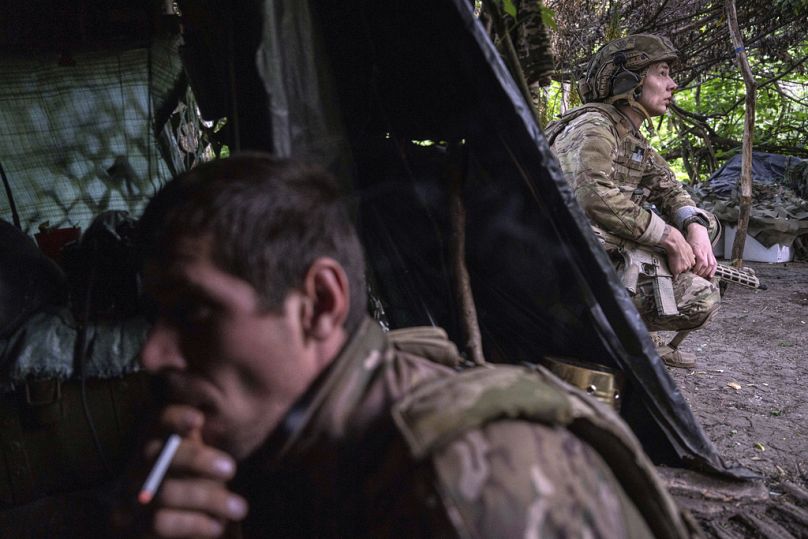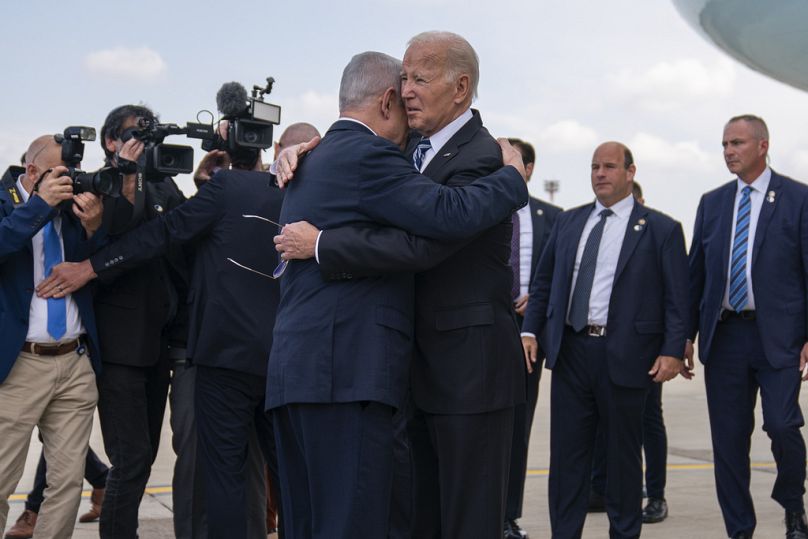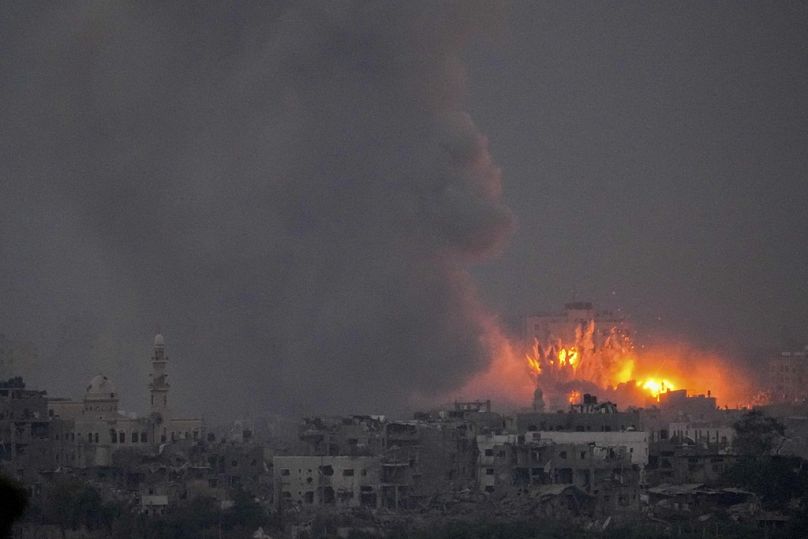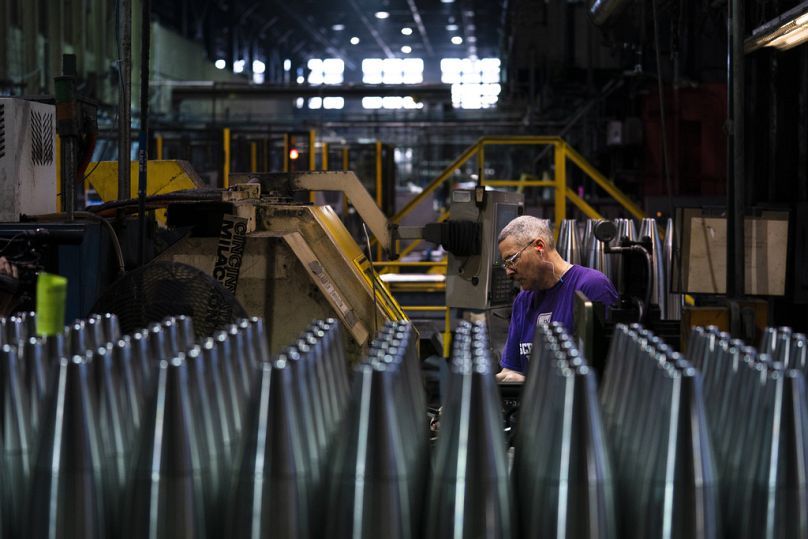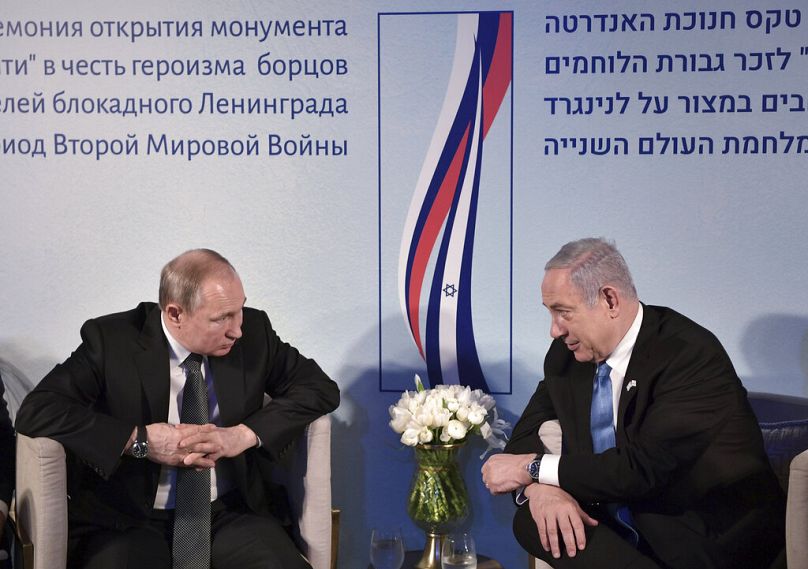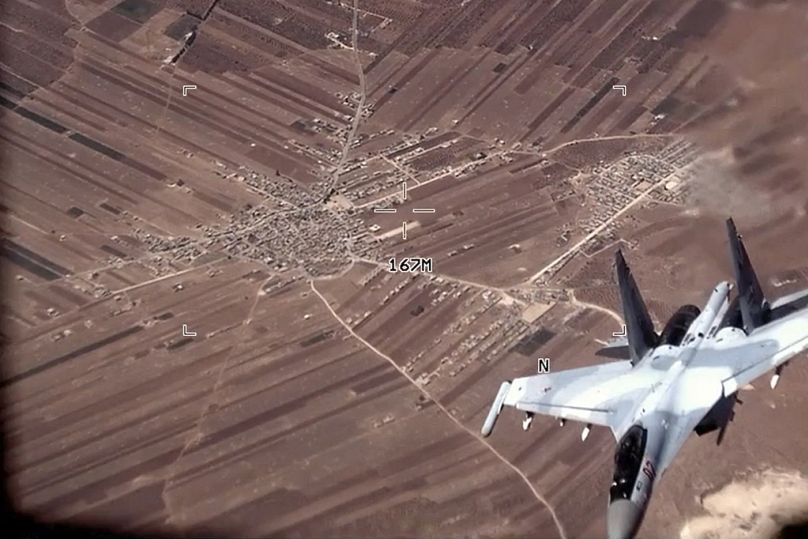With Putin's good relations with Israel and the Arab world, Russia has a vested interest in continuing to play both sides while the world remains distracted from its failed war in Ukraine. However, the advantage is only temporary, David Kirichenko writes.
As tensions flare in the Middle East, global attention has swivelled to the region, providing Vladimir Putin with what he desperately needs: the world to lose its interest in his war in Ukraine.
 ADVERTISEMENT
ADVERTISEMENT
 ADVERTISEMENT
ADVERTISEMENT
A long protracted low-intensity war in the Middle East is what Putin is hoping for — not enough to transform into a large regional conflict, yet lasting long enough to have the West divert attention and resources away from Ukraine.
He wants Washington — and others — to support and supply Israel instead, and as a result, provide a public smokescreen for Russia’s offensive in the Donbas.
And this is exactly what happened: as the world was turning its attention to the carnage in Israel following 7 October, Russian forces launched a sizable counterattack in Avdiivka just two days later.
Russia attempts to take advantage in the Donbas
With Russia almost two years into its failing "special military operation", the turmoil couldn’t have come at a better time for Putin.
Control over Avdiivka, located on the northern outskirts of Donetsk — a city partially occupied by Russian forces — has allowed the Ukrainian army to act against the enemy by means of artillery superiority and could serve as a springboard to free the entire urban centre.
Highlighting Avdiivka's importance, just last week, Russian Defence Minister Sergei Shoigu lauded his troops for “prohibiting Ukrainian advances” near the city of formerly 32,000.
However, after 20 months of conflict, his omission of any Russian advancements highlights the current predicament of his army, showing Moscow's desperation.
The Kremlin continues to throw its resources at surrounding Avdiivka, setting up for what looks to be the meatgrinder of a new Bakhmut, with Putin possibly aiming to deplete Ukraine's ammunition, banking on the possibility of US war funding dwindling.
As US President Joe Biden attempts to link aid for Ukraine and Israel, nine Republican senators have already urged for separate considerations of aid for the two nations, all ahead of the White House's push for a $100 billion (€94bn) foreign funding request, which includes funding for Israel and Ukraine.
Western military aid remains essential
Even before the outbreak of hostilities between Israel and Hamas, about half of US House Republicans recently opposed a relatively small $300 million (€282m) aid package for Ukraine.
It’s perhaps an early indication of the direction a Trump administration would take on Ukraine as Trump Republicans, especially those on the far-right, have been at the forefront of trying to slash aid meant for Ukrainian military assistance from the proposed budget.
Despite the Israel-Hamas conflict potentially diverting resources, Biden has been trying to assure allies that the US will still continue to fund support for Ukraine.
The US recently deployed its Army Tactical Missile Systems (ATACMS) to Ukraine, which were used by Ukrainian forces to strike Russian airfields in Berdyansk and Luhansk.
These strikes, according to Kyiv's defence ministry, resulted in significant losses for Russia, including nine helicopters, air-defence equipment, and ammunition depots.
Britain's defence ministry estimated higher damages, suggesting the possibility of nine helicopters destroyed in Berdyansk alone and an additional five in Luhansk. British intelligence also believes the severity of these strikes might prompt Russia to relocate its bases further from the front lines, complicating its logistics.
The Telegraph reported Ukrainian Foreign Minister Dmytro Kuleba's confirmation that the US will continue supplying advanced missiles to Ukraine, putting a lot more pressure on Russian forces.
ATACMS have the potential to alter the war's trajectory if given in larger quantities, enabling Ukrainian forces to target previously inaccessible Russian supply lines, air bases, and rail networks in occupied areas. It also serves as a key example of why continued arms donations are essential if Ukraine is to drive the invading forces out of its territory.
'A new source of pain undermining world unity'
Sergey Mardan, one of Russia’s best-known propagandists, recently wrote on his Telegram channel that “This mess is beneficial for Russia because the globalist toad will be distracted from [Russia's war in] Ukraine and will get busy trying to put out the eternal Middle Eastern fire.
"Iran is our real military ally. Israel is an ally of the US. Therefore, choosing a side is easy,” Mardan concluded, making the Kremlin's intentions even more clear.
Kyiv also believes that Russia is a major beneficiary of the growing conflict between Israel and Hamas in Gaza.
Ukrainian President Volodymyr Zelenskyy stated that “Russia is interested in triggering a war in the Middle East so that a new source of pain and suffering could undermine world unity, increase discord and contradictions, and thus help Russia destroy freedom in Europe.”
Kyrylo Budanov, Head of Defence Intelligence of Ukraine (DIU), claimed that the Russians supplied the Hamas group with infantry armaments that they managed to seize in Ukraine and that Russians taught the Hamas militants how to use FPV-drones against armoured equipment.
Will the ammunition shortage become an even bigger problem?
Russian-made weapons, including anti-tank and shoulder-launched anti-aircraft missiles, have found their way into Gaza in the past, most likely through Iran.
Yet, there still isn’t concrete information that Russia supplied Hamas with weapons. So far, one Israeli official claimed that some of the weapons used by Hamas came from Russia.
Meanwhile, international press initially reported that the US intended to redirect tens of thousands of artillery rounds from Ukraine to Israel.
However, a US official refuted this claim. Meanwhile, the chair of NATO's Military Committee, Lieutenant Admiral Rob Bauer, has previously expressed concerns about allied ammunition supplies nearing depletion, and the risk of Ukraine not having the ammunition it desperately needs is indeed real.
Yet, it was DIU's Budanov who emphasised that “if the situation drags on, then there will definitely be some problems as Ukraine will not be the only state to need armament and ammunition supplies.”
The impact is already felt on the battlefield. British-supplied artillery guns are facing ammunition shortages, limiting their use. Ukrainian soldiers trained on L119 howitzers report firing them infrequently due to a severe lack of shells.
This, in turn, was cause for celebration back in Moscow. Russian military analyst Boris Dzherelievsky also believes that a “long war would lead to Minsk III and the surrender of vast swathes of Ukraine, including Odesa and Mykolaiv, to Russia.”
Not all is rosy for Russia, either
However, not everything is rosy for the Kremlin, either. If events continue to escalate tensions into a large-scale war, Russia has its own reasons to be concerned as well: already, Syrian artillery has hit Israel, and Israel has targeted Iranian-backed assets in Syria, including conducting airstrikes on Syrian airports. This only increases the risk of Israel engaging with Russian forces in Syria.
Russia is keen on balancing between its main military ally, Iran, and its close partnership with Israel, as Putin and Israeli PM Benjamin Netanyahu share a friendly relationship.
Hamas representatives reportedly met with Russian Foreign Minister Sergey Lavrov in March, stating that the organisation is running out of patience with Israel. Additional meetings between senior Hamas members and Russia occurred in May and September 2022.
The Soviet military historically supported Arab armies, particularly Egypt and Syria, in their efforts against Israel, especially during the wars in the 1960s and the 1970s.
In contrast, contemporary relations between Israel and Russia are characterised by military coordination, particularly in Syria. Israel values its positive relationship with Russia, recognising Moscow's significant influence in the war-torn neighbouring country.
If Russia was caught red-handed supporting Hamas, it would unravel the close ties between Putin and Netanyahu, which Russia is desperate to maintain.
Benefits are temporary at best
The highly volatile atmosphere is perhaps best illustrated by the recent interview with Amir Weitman, chairman of the Libertarian faction of Israel's ruling Likud party, who openly threatened Russia on its own propaganda channel RT: “After we win this war, we will make sure Ukraine wins as well and we will make sure Russia will pay for what it has done.”
If anything, Wietman's words show that a major reshuffle of sides could well be on the cards, all depending on who Russia chooses to side with — a decision the Kremlin might not be able to stall over forever.
Russia might benefit temporarily from a renewed Western focus on the Middle East, but a full-scale war between Iran and Israel, potentially involving Syria, would stretch its resources, and with its military largely committed to Ukraine, a war of that size would definitely threaten its position as well as its forces in Syria.
Thus, at some point, the Kremlin's hand might be inevitably forced by the sheer magnitude of the brewing conflict.
On top of that, US Senate Minority Leader Mitch McConnell recently labelled China, Russia, and Iran as the new “axis of evil”, signalling that sooner or later, Israel will have to take a hard stance against Russia, too.
We should be aware of the smokescreen
Moscow continues to value its ties with Israel and Arab states, even as it grows closer to Iran. Following the attack on Israel on 7 October, Russia has been quick to cynically position itself as a peace broker in the Middle East, presenting a draft resolution in the UN Security Council, though it failed to gain majority support.
Putin's delay in expressing condolences to Netanyahu after the attack and Russia's pro-Palestinian media stance also reflect the bind he is in.
However, Moscow's strategy will still hinge on balancing relations with multiple Middle Eastern players to maximise its benefits, at least for now.
Nonetheless, Russia has been quick to benefit from the situation by expanding military operations in Ukraine, while being cautious that things can quickly pull Russia in a direction where it doesn’t want to go.
And we can't stop paying attention to its actions now and allow Moscow to use other flashpoints as a smokescreen for its own destructive goals.
David Kirichenko is a freelance journalist and an associate research fellow at the Henry Jackson Society, a London-based think tank.
At Euronews, we believe all views matter. Contact us at view@euronews.com to send pitches or submissions and be part of the conversation.











